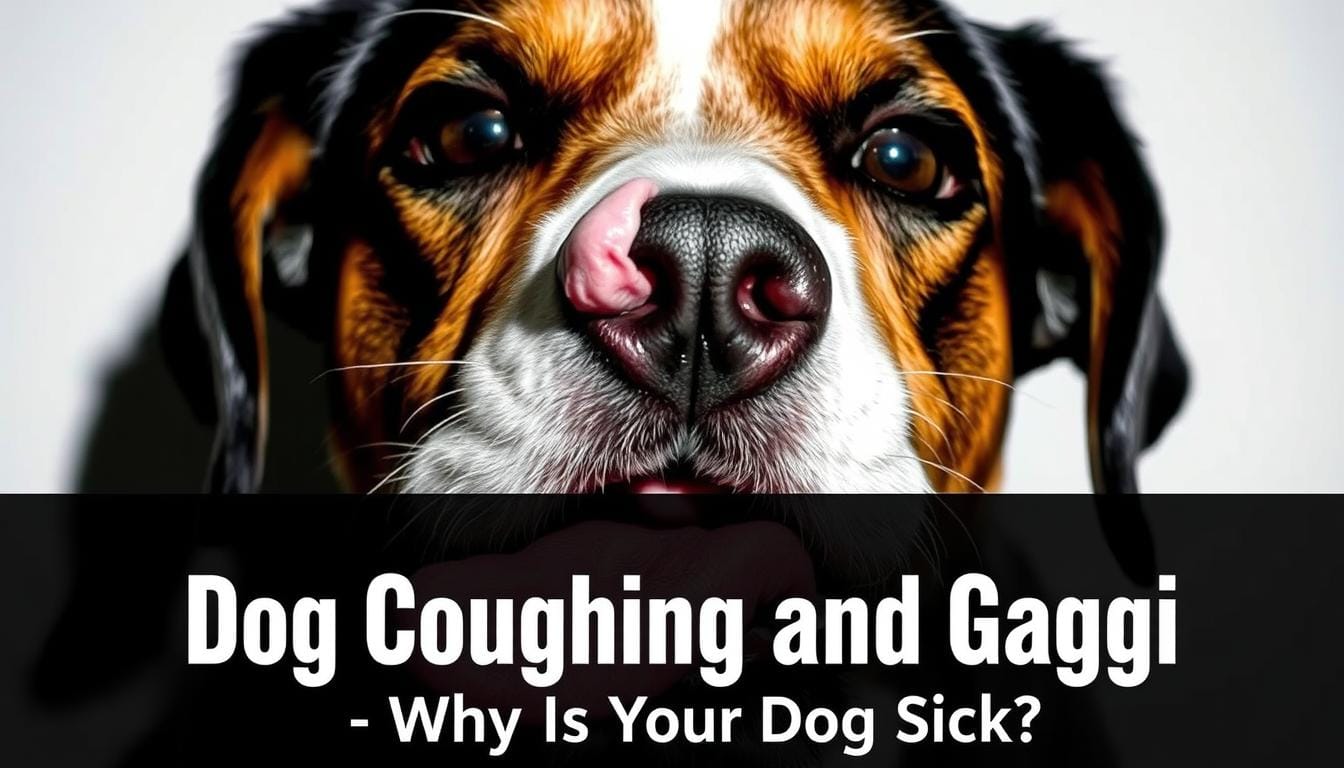Dog Coughing and Gagging: Why Is Your Dog Sick?
Your heart races as you watch your beloved furry friend struggle with an unexpected cough. Those innocent dog coughing and gagging sounds turn from a mild annoyance to a health alarm. Every pet parent knows that moment of worry when something seems off with their four-legged companion.
Table of Contents
Why is my dog coughing? This question echoes in the minds of countless dog owners. About 80% of dogs experience coughing or gagging at some point in their lives. It’s a common yet often misunderstood health issue. Understanding these symptoms could be the difference between a minor concern and a serious medical condition.
Dogs communicate through their behaviors, and coughing is their way of signaling that something isn’t right. Whether it’s a simple throat irritation or a more complex respiratory challenge, each cough tells a story about your dog’s health. It requires careful attention and understanding.
Key Takeaways
- Coughing and gagging are common in dogs, affecting about 80% of canines
- Symptoms lasting over 48-72 hours may indicate a serious condition
- Respiratory infections are the leading cause of dog gagging
- Regular veterinary check-ups can help early diagnosis
- Different breeds have varying risks for respiratory issues
Understanding Dog Coughing and Gagging: The Basics
When your dog coughs and gags, it can worry you. Knowing the difference between these symptoms is key. A dog gagging cough can mean many things, from minor issues to serious health problems.

Dogs cough and gag in different ways. Coughing is when they force air out of their throat. Gagging is like a retching motion but doesn’t make them vomit. Knowing why your dog is doing this can help you figure out what’s going on.
Differences Between Coughing, Gagging, and Vomiting
- Coughing: A sharp, hacking sound to clear airways
- Gagging: A retching motion without expelling content
- Vomiting: Forceful expulsion of stomach contents
Common Symptoms to Watch For
When looking at a dog gagging cough, watch for these signs:
- Persistent or recurring cough
- Mucus or phlegm production
- Labored breathing
- Decreased appetite
- Lethargy or reduced energy
When Normal Becomes Concerning
Some coughing is normal for dogs. But if it lasts a week or more, or comes with other symptoms, see a vet fast.
Knowing these basics helps you care for your dog better. It also tells you when to get vet help.
Common Causes of Dog Coughing and Gagging

Figuring out why your dog is coughing and gagging can help you understand how serious the issue is. Dogs can develop these symptoms from many causes, ranging from minor irritants to severe health problems.
The most common reasons for dog coughing and gagging include:
- Respiratory Infections: Kennel cough, a highly contagious illness, often triggers persistent coughing and gagging.
- Foreign objects stuck in the throat
- Allergic reactions
- Underlying heart or lung diseases
Certain breeds, like flat-faced dogs (pugs, bulldogs), are prone to breathing issues that worsen dog coughing and gagging. These symptoms may signal:
- Tracheal collapse
- Viral/bacterial infections
- Early warning signs of chronic conditions
If your dog’s coughing and gagging lasts over a week or includes fever, lethargy, or labored breathing, consult a vet immediately. While occasional coughs are normal, frequent episodes require professional evaluation.t mean they have a health issue. This needs a vet’s check.
Respiratory Infections and Kennel Cough in Dogs
Dog coughing and gagging often come from respiratory infections. Kennel cough is a big reason why. Knowing why your dog coughs helps understand these infections that spread fast among dogs.
Kennel cough affects dogs of all ages, breeds, and backgrounds. It’s caused by many pathogens, making it a big health issue for pet owners.
Bacterial vs. Viral Infections
Respiratory infections in dogs are mainly two types:
- Bacterial infections: Usually caused by Bordetella bronchiseptica
- Viral infections: Includes canine parainfluenza and adenovirus
How Kennel Cough Spreads
Dogs get kennel cough from:
- Being close to sick dogs
- Places like boarding facilities
- Grooming places
- Doggie daycares
Symptoms of Respiratory Infections
Look out for these signs of dog coughing and gagging:
- A persistent, forceful cough
- A honking or dry cough sound
- A runny nose
- Sneezing
- A mild fever
Most dogs get better in 1-3 weeks. But, it’s important to keep an eye on your pet’s health during this time.
Heart Disease and Its Connection to Coughing
If your dog keeps gagging and coughing, it could mean heart disease. Knowing how heart issues and coughing are linked helps spot problems early.
Heart disease in dogs shows up in many ways, with coughing being a big warning sign. A cough in your dog could mean serious heart problems that need quick action.
- Persistent coughing, often during rest or at night
- Less energy and trouble exercising
- Hard time breathing
- Blue color on the tongue
Why is my dog coughing and gagging? Often, it’s because of heart problems like mitral valve insufficiency. About 80% of heart failure in dogs comes from this valve issue.
Dogs with serious heart disease might get pulmonary edema. This is when fluid builds up in the lungs, causing a wet, phlegmy cough. This cough is different from what you see in regular respiratory infections.
Early detection is key. Regular vet visits can catch heart issues early. Keep an eye on your dog’s breathing rate and behavior changes to check their heart health.
If your dog coughs a lot and is less active or has trouble breathing, see your vet fast. Tests like chest X-rays, ECG, and echocardiograms can fully check your dog’s heart.
Tracheal Problems and Breathing Difficulties
Dogs can face serious breathing issues that make it hard for them to breathe. Tracheal problems are a big worry for pet owners, mainly for small breed dogs. These dogs are more likely to have breathing troubles.
Small breed dogs are more likely to have tracheal issues. These issues can lead to ugly dog coughing and gagging. Knowing about these problems can help you spot health issues early.
Collapsed Trachea in Small Breeds
Tracheal collapse is a serious respiratory problem mainly seen in small dog breeds. It happens when the cartilage rings in the trachea weaken. This makes breathing hard for these dogs.
- Most common in Pomeranians, Yorkshire Terriers, and Toy Poodles
- Typically affects middle-aged dogs
- Graded in four severity levels from 25% to 100% tracheal lumen reduction
Laryngeal Paralysis in Large Breeds
Large breed dogs also have their own breathing challenges. Laryngeal paralysis can cause dog gagging and breathing problems. It often needs special vet care.
- Impacts larger dog breeds more frequently
- Can cause noisy breathing and exercise intolerance
- Requires careful management and possible surgery
If your dog keeps coughing, gagging, or having trouble breathing, see your vet. They can check your dog and find the right treatment.
When to Seek Immediate Veterinary Care
Knowing when your dog’s coughing and gagging are serious can save their life. Some symptoms need immediate vet care. It’s important to recognize these warning signs to act fast when your dog’s health is at risk.
You should seek emergency care if your dog experiences:
- Difficulty breathing with increased respiratory rate
- Coughing up blood
- Persistent cough lasting more than a few days
- Extreme lethargy or loss of appetite
- Wheezing or open-mouthed breathing
Why is my dog coughing so persistently? Some conditions need urgent medical help. A wet, deep chest cough might mean pneumonia. A dry hack could signal serious respiratory issues.
Critical warning signs include:
- Breathing distress – rapid, labored breathing
- Bluish gum color – indicating oxygen deficiency
- Fainting or collapsing – possible heart or respiratory problem
Your vet can do tests to find out why your dog is coughing. They can then treat it properly. Acting quickly can stop minor problems from becoming serious emergencies.
Diagnosis and Treatment Options
If your dog keeps gagging and coughing, it’s time to see a vet. Knowing why your dog is coughing helps find the best treatment.
Common Diagnostic Tests
Vets use many tests to find out why your dog is coughing:
- Comprehensive physical examination
- Chest X-rays to check lungs and heart
- Blood work for infections
- Heartworm testing
- Respiratory function tests
Available Treatment Methods
Treatment for dog coughing depends on the diagnosis. Here are some options:
- Antibiotics for bacterial infections
- Bronchodilators for breathing issues
- Heart medication for heart problems
- Cough suppressants
- Anti-inflammatory drugs
Recovery and Management
Managing your dog’s coughing needs patience and vet advice. Some issues need long-term care, while others get better fast. Early detection and vet help are vital for recovery.
Stick to your vet’s advice and watch your dog’s health closely. This ensures they get better fast and stay healthy.
Prevention Strategies and Home Care
To keep your dog safe from gagging and coughing, you need to take action. Knowing how to keep their breathing healthy is key. This can help avoid serious health issues.
Here are some important steps to prevent dog coughing and gagging:
- Keep vaccinations current to prevent respiratory infections
- Maintain a clean living environment
- Minimize exposure to sick dogs
- Regular veterinary check-ups
Vaccines are vital in stopping dog coughing and gagging. The kennel cough vaccine is a must for dogs that meet many other animals. Dogs in places like dog parks or training groups need this vaccine.
Home care can also help with breathing issues:
- Monitor your dog’s breathing patterns
- Avoid smoky or dusty environments
- Use air purifiers to reduce allergens
- Maintain a healthy diet supporting immune function
Early detection and prevention are your best defense against respiratory problems in dogs. Look out for persistent coughing, unusual gagging, or breathing changes. If you’re unsure, talk to your vet right away. This ensures your dog stays healthy and happy.
Conclusion
It’s important to know about dog coughing and gagging to keep your pet healthy. Not all instances of dog coughing and gagging are serious, but quick action can help prevent bigger health problems.
Seeing a vet quickly can greatly improve your dog’s chances of recovery, especially if dog coughing and gagging persists. If your pet keeps struggling with these symptoms, get help right away. Signs like trouble breathing or prolonged dog coughing and gagging (more than a few days) need urgent vet care.
Dog coughing and gagging can signal different issues depending on breed and size. Small dogs might experience tracheal collapse, while larger breeds like Labradors are prone to laryngeal paralysis. Tracking patterns in your dog’s coughing and gagging helps ensure they stay healthy and happy.
Monitoring dog coughing and gagging is key to preventing long-term issues. Regular vet visits, prompt intervention for symptoms, and observing changes in breathing are critical. By addressing dog coughing and gagging early, you help your dog live a longer, happier life.
FAQ
What causes my dog to cough and gag?
Dogs cough and gag for many reasons. This includes infections like kennel cough, heart disease, and tracheal problems. Allergies, foreign objects, or eating too fast can also cause it. The exact reason depends on your dog’s symptoms and health.
When should I be worried about my dog’s cough?
Be worried if your dog’s cough lasts more than a week. Also, if it’s with fever, lethargy, or trouble breathing. Blood or unusual discharge, or a harsh cough, means it’s serious. These signs need vet help right away.
Is kennel cough dangerous for my dog?
Kennel cough is usually mild but can be serious in some dogs. Puppies, older dogs, or those with weak immune systems are at risk. Most dogs get better in 1-2 weeks. Vaccines and vet care can prevent severe cases.
Can heart disease cause my dog to cough?
Yes, heart disease can lead to coughing, often in older dogs. It happens when the heart can’t pump well, causing fluid in the lungs. Other signs include tiredness, weakness, and breathing trouble.
How can I prevent respiratory issues in my dog?
Keep vaccinations up to date and avoid sick dogs. Keep your home clean and manage stress. Feed a balanced diet and see the vet regularly. Avoid extreme temperatures to keep your dog’s lungs healthy.
What diagnostic tests might a vet perform for a coughing dog?
Vets might do chest x-rays, blood tests, and heartworm tests. They might also do tracheal washes, ultrasounds, or ECGs. These help find the cause of the cough, like infections or heart problems.
Can small breed dogs be more prone to coughing?
Yes, small breeds like Chihuahuas and Pomeranians are at risk. They can get tracheal collapse, causing coughing and breathing trouble. Keeping them healthy and avoiding neck strain helps.
Are some dog breeds more likely to develop respiratory issues?
Breeds like Bulldogs and Pugs face breathing problems due to their faces. They often cough and gag because of this. Keeping them cool and comfortable helps manage these issues.
There are no reviews yet. Be the first one to write one.







